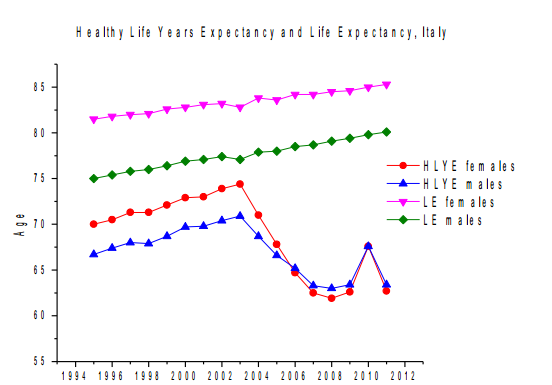Ugo Bardi in Virginia Perini z Univerze v Firencah sta objavila študijo, v kateri sta pokazala, da se je zdravje prebivalcev Italije začelo leta 2003 dramatično poslabševati, podobne trende pa opažajo tudi drugje po Evropi. Natančnega odgovora, kaj je povzročilo padec pričakovanega obdobja zdravega življenja, ki se lepo vidi na grafu, še ni, a hipoteza italijanskih raziskovalcev je, da se glavni vzrok skriva v ekstremnem vročinskem valu, ki je Evropo prizadel leta 2003. Takrat je samo avgusta zaradi posledic vročine umrlo 45.000 ljudi. Kot trdita raziskovalca, je vročina pustila posledice tudi na ostali populaciji, kar statistike zaznajo kot krajšanje pričakovane dobe zdravega življenja.
For many years, the number of years of healthy life have increased in line with life expectancy. For example, in Italy between 1995 and 2003, life expectancy increased from 75 to 80.1 for men and from 81.8 to 85.3 for women. At the same time, the number of years of healthy life increased from 66.7 to 70.9 for men and from 70 to 74.4 for women.
But in 2003, all that changed. The number of healthy years of life began to drop steeply, eventually stabilising around 62 years for both sexes. So while men and women are living longer, they are having fewer years of healthy life today than they did ten years ago. …
That’s an extraordinary change. But it’s not limited to Italy. A similar drop occurred after 2003 in Belgium, Germany, Ireland, Greece, Spain, Austria, Portugal, Finland and Sweden. In France, a less pronounced drop occurred in 2006.So almost everywhere in Europe, people are living longer but having fewer years of healthy life. Only in the UK, Denmark and the Netherlands did people buck this trend with the numbers of years of healthy life increasing in these places since 2003.
That raises an obvious question: what happened in 2003?
Bardi and Perini say the obvious culprit is the weather. In 2003, Europe experienced one of the most extreme heat waves on record. In August 2003 alone, an extra 45,000 people died across Europe, almost certainly because of complications associated with the high temperatures.
But this heat wave must have had other effects too. “It must have affected also the general health of those who survived the wave,” say Bardi and Perini.
Their hypothesis is that the extreme conditions triggered long term illnesses, particularly among those suffering from the chronic conditions such as diabetes, heart disease and so on.
Vir: European Health Levels Suddenly Collapsed After 2003 And Nobody is Sure Why — The Physics arXiv Blog — Medium
Ref: arxiv.org/abs/1311.3799 : Declining Trends Of Healthy Life Years Expectancy (HLYE) In Europe









nič se neumne delat….glavni razlog za poslabšanje zdravja je EU in parlamentarci posamezih držav, ki furajo njen ritem….ne znajo vsi živeti z in pod stresom brez posledic za zdravje….da ne omenjam revščine, katero je povzročila EU posebej….